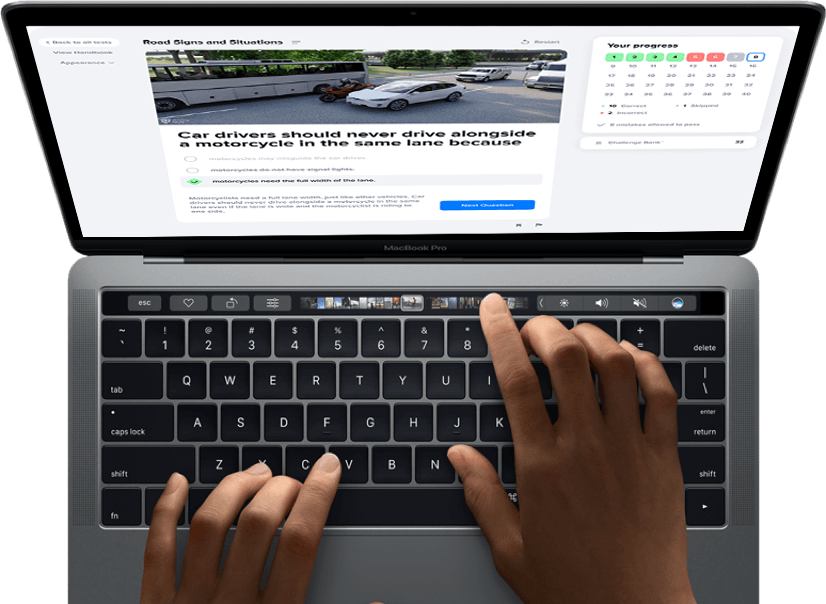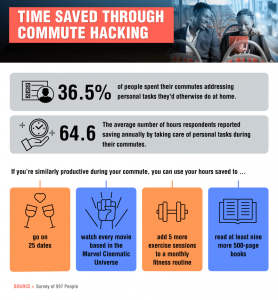
- Resenting the Drive
- Forfeiting Personal Time
- Desperate Times, Desperate Measures
- Digital Detoxing
- Bold Commitments
- Permanent Sacrifices
- Put Your Money Where Your Drive Is
- Dreaming of Ditching Your Drive
Even if you pass the time with an audiobook, podcast, or a language-learning app, long commutes will eventually start to wear you out.
Every year, the average commuter wastes 42 hours sitting in traffic and spends $1,400 in idling gas money each year. Even worse, research shows long commutes are bad for both your physical and mental health. The longer it takes you to drive to and from work, the higher the chances you have of missing out on sleep, becoming obese, or experiencing depression. Yet, a commuter’s average drive time continues to rise across the country.
To understand just how bad daily commutes have gotten and how far most people are willing to go to cut back on the time they spend behind the wheel, we surveyed 943 people from some of the busiest cities across the country. Read on as we explore which cities have the worst commutes in America and the crazy things commuters would be willing to do (from abstaining from porn to getting an unwanted tattoo) to shorten their drive time.
Resenting the Drive
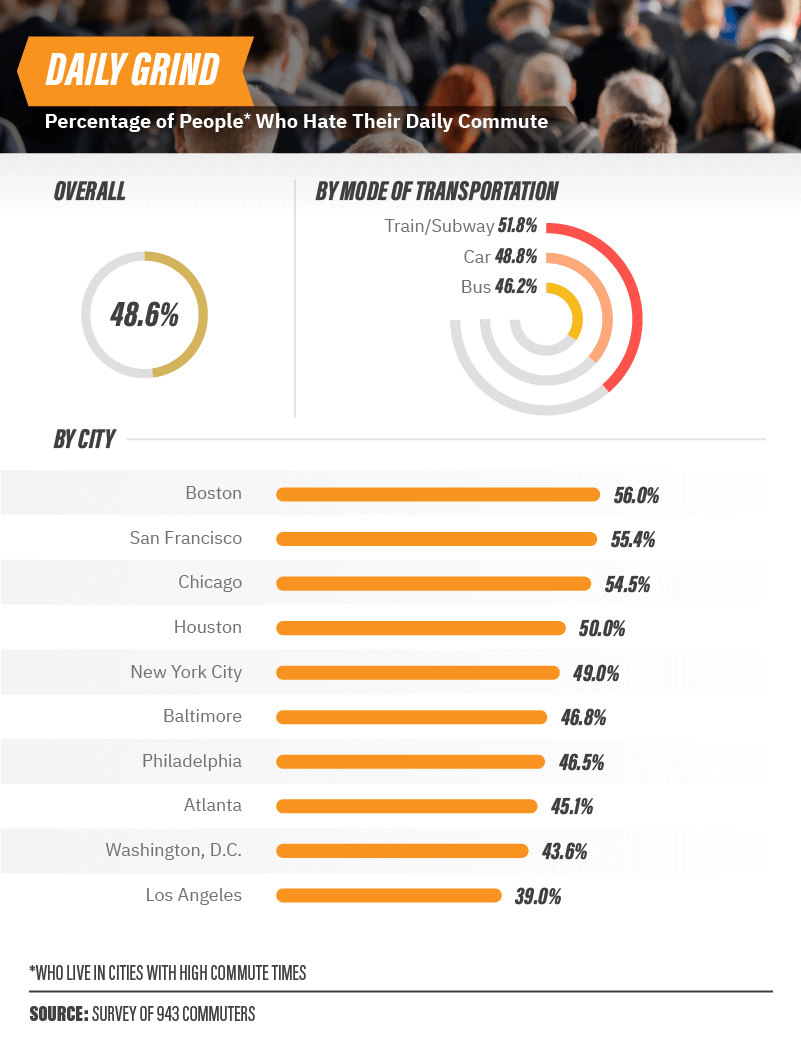
Sure, there are ways to try and pass the time. Especially if you commute via public transportation, the minutes or hours you spend traveling to and from work aren’t entirely wasted. But eventually, the power of those distractions may fade, and you’ll be left with an unmistakable truth: Your drive to work is a real pain in the neck.
Forty-eight percent of people in some of the biggest cities in America admitted to hating their commutes. Contempt for the commute was highest in Boston, Massachusetts and San Francisco, California, where 55 to 56 percent of people acknowledged hating their daily drive. Not only do San Francisco residents have to deal with living in one of the most expensive cities in the world, but also the commute accounts for 500 days over the course of their lifetime.
This sentiment was similar in Chicago (54 percent of people hated their commute), Houston (50 percent), and New York City (49 percent). Even in cities where public transportation may be readily available, not being stuck behind the wheel may do nothing to quell commuters’ resentment for the road. Compared to 48 percent of people commuting by car, around 52 percent of people traveling to and from work by train expressed hating their commute.
Forfeiting Personal Time
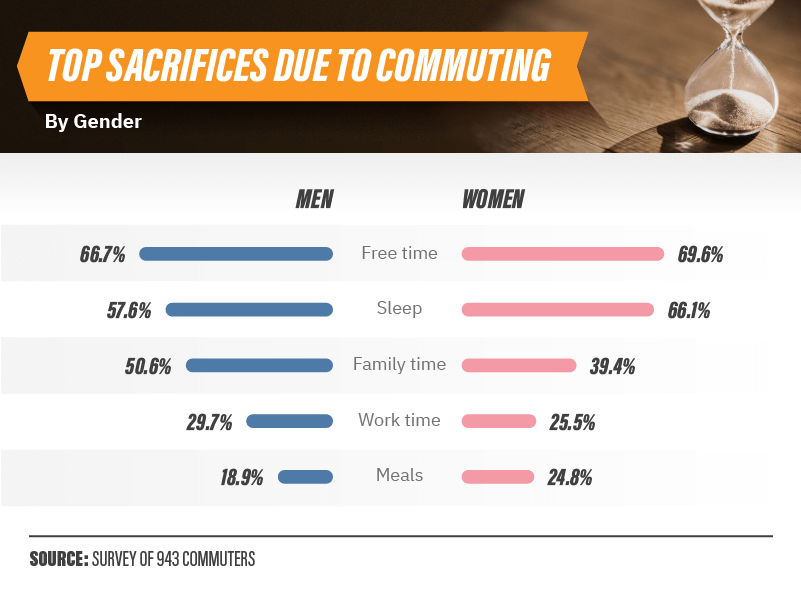
For some drivers, dread for the commute isn’t as much about the time spent sitting in traffic – it’s about the daily activities missed out on instead. Seventy percent of women and 68 percent of men in busy cities said they sacrificed their free time as a result of having to drive back and forth from work. Longer commutes can make it difficult for employees to establish an effective work-life balance, which might be why it has a profound effect on their overall happiness.
The sacrifices don’t end with free time, though. 66 percent of women and nearly 58 percent of men gave up sleep to make time for their daily commute, followed by 51 percent of men who lost time with family and 30 percent who lost time they could spend working. Even though long commutes may seem like a sacrifice people have to make for their jobs, the negative effects can follow them into the office. Studies show people with longer drive times experience lower levels of productivity at work compared to those with shorter commutes.
Desperate Times, Desperate Measures
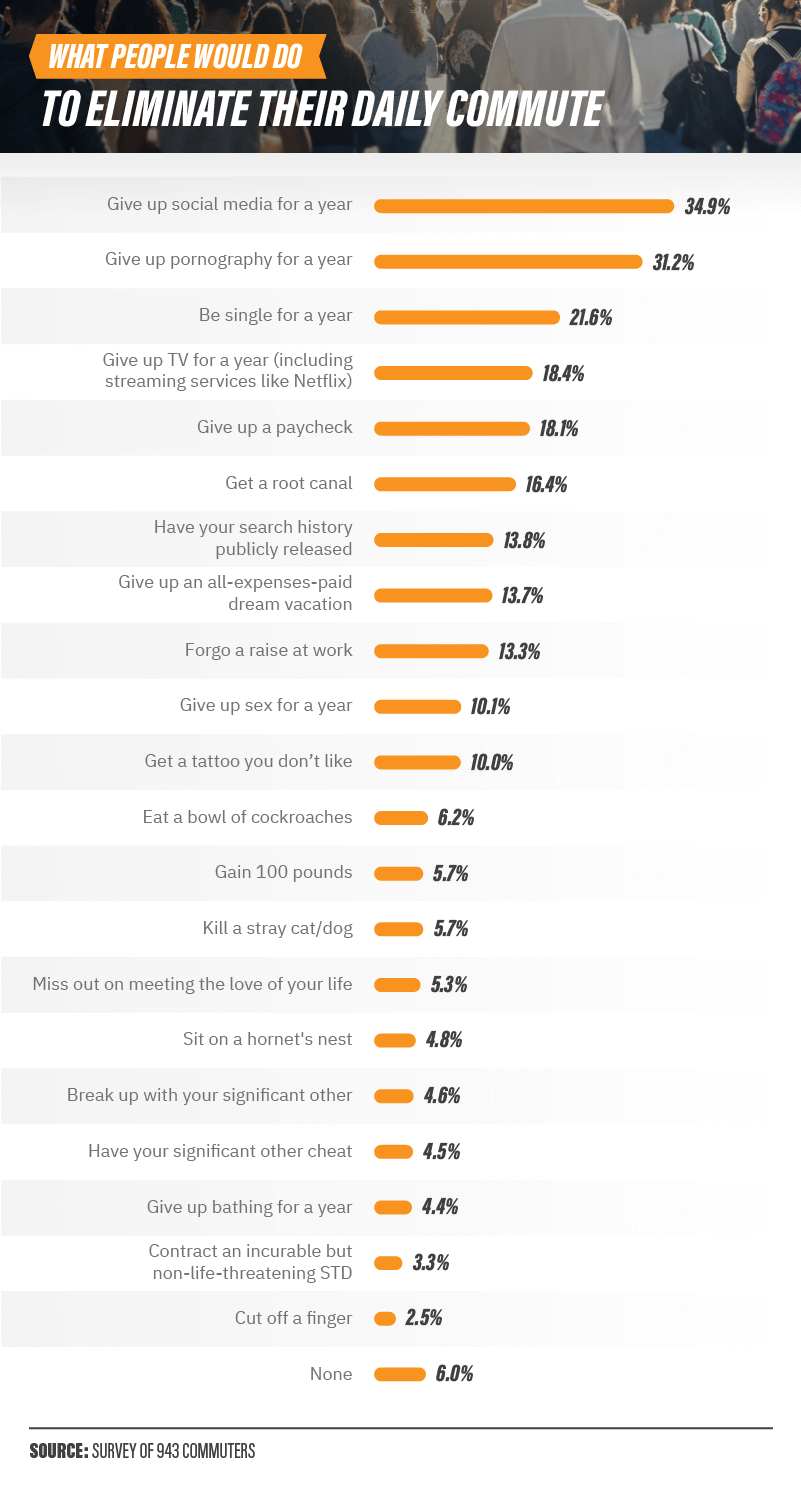
So just how bad are these daily drives? To understand just how much people hate their commute to work every day, we asked them what they’d be willing to give up to shorten it. While their responses ran the gamut from giving up sex for a year (10 percent) to giving up social media for a year (35 percent), only 6 percent of commuters couldn’t find anything they’d be willing to do if it meant eliminating their daily commute.
Among the most common sacrifices that commuters were willing to make were social media and pornography. Thirty-one percent of commuters were willing to stop watching porn for a year if they could stop wasting so much time commuting. Other popular selections included being single for a year (22 percent), giving up TV for a year (18 percent), giving up a paycheck (18 percent), and getting a root canal (16 percent). It may sound extreme, but nearly 3 percent of respondents even went so far as to offer cutting off a finger.
Digital Detoxing
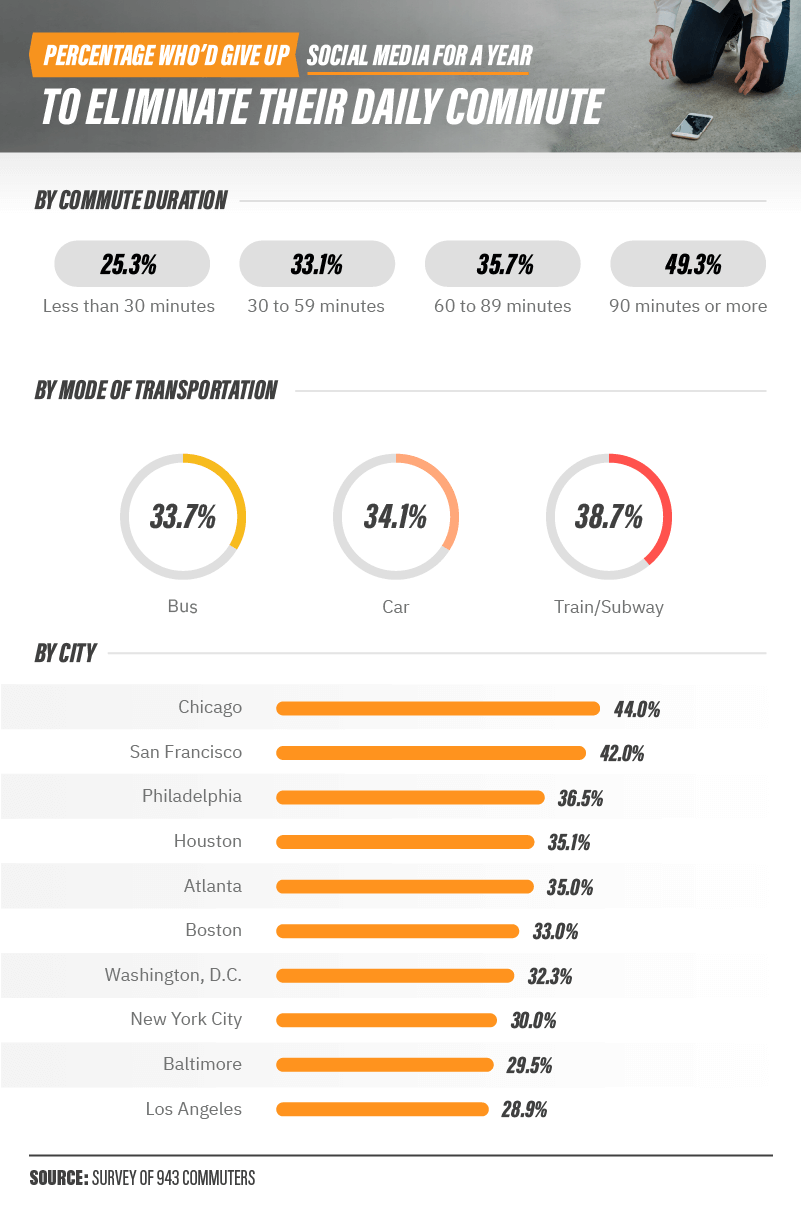
Deleting Facebook or Instagram in exchange for a magically shorter commute may sound like an easy trade to some, but giving up social media can be far more complicated. You probably already know you’re spending too much time on social media, but did you know it’s possible to be addicted to scrolling, swiping, liking, and retweeting? If “detoxing” from your social feed already sounds hard enough, imagine having to give it up for a year.
The longer the commute, the higher the likelihood someone would be willing to ditch their social media. Compared to 25 percent of people who traveled less than 30 minutes a day to work and were willing to give up social media in exchange for eliminating their drive time, 49 percent of those with commutes lasting longer 90 minutes or more said the same. Four million people across the country spend an hour and a half or more every day just getting to work – often referred to as “super-commuters.”
Forgoing social media in exchange for eliminating their commute was almost equally popular among bus and car travelers, although close to 39 percent of people getting to work by train or subway felt compelled to barter with their time. Drivers in Chicago, San Francisco, and Philadelphia were often the most willing to consider renouncing social media for the sake of getting their commute time back.
Bold Commitments
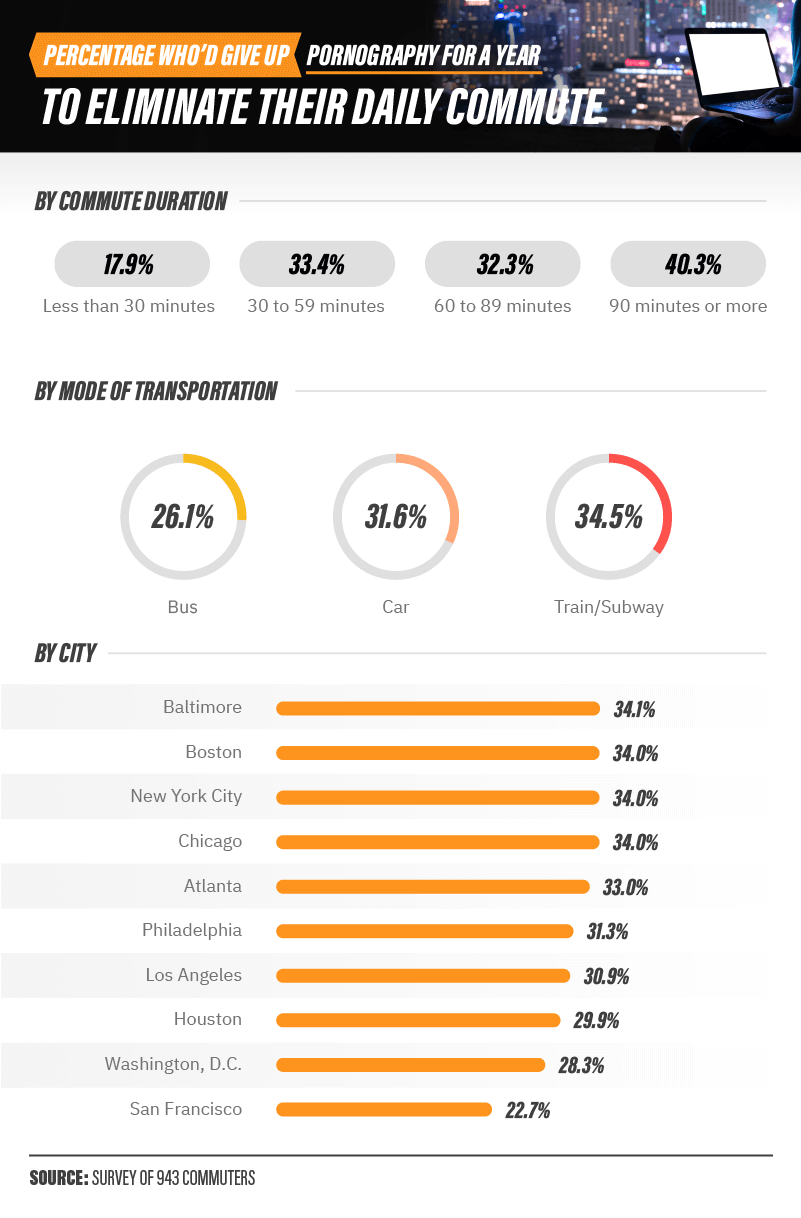
Yes, giving up social media can be difficult, but what about giving up pornography? Even if it’s embarrassing to talk about, there are plenty of health benefits to watching porn, including increasing sexual satisfaction and lowering stress.
Still, if your commute is long enough (or the traffic is bad enough), you might not care nearly as much about the perks of watching pornography. While under 18 percent of people with commutes less than 30 minutes were willing to trade porn for their daily drive, 40 percent of super-commuters would offer to make the switch. People taking the train or subway to work were also more willing to consider the exchange. Over 1 in 3 people commuting in Baltimore, Boston, New York City, and Chicago said they would give up watching porn for the next year if they could trade in their everyday drive.
Permanent Sacrifices
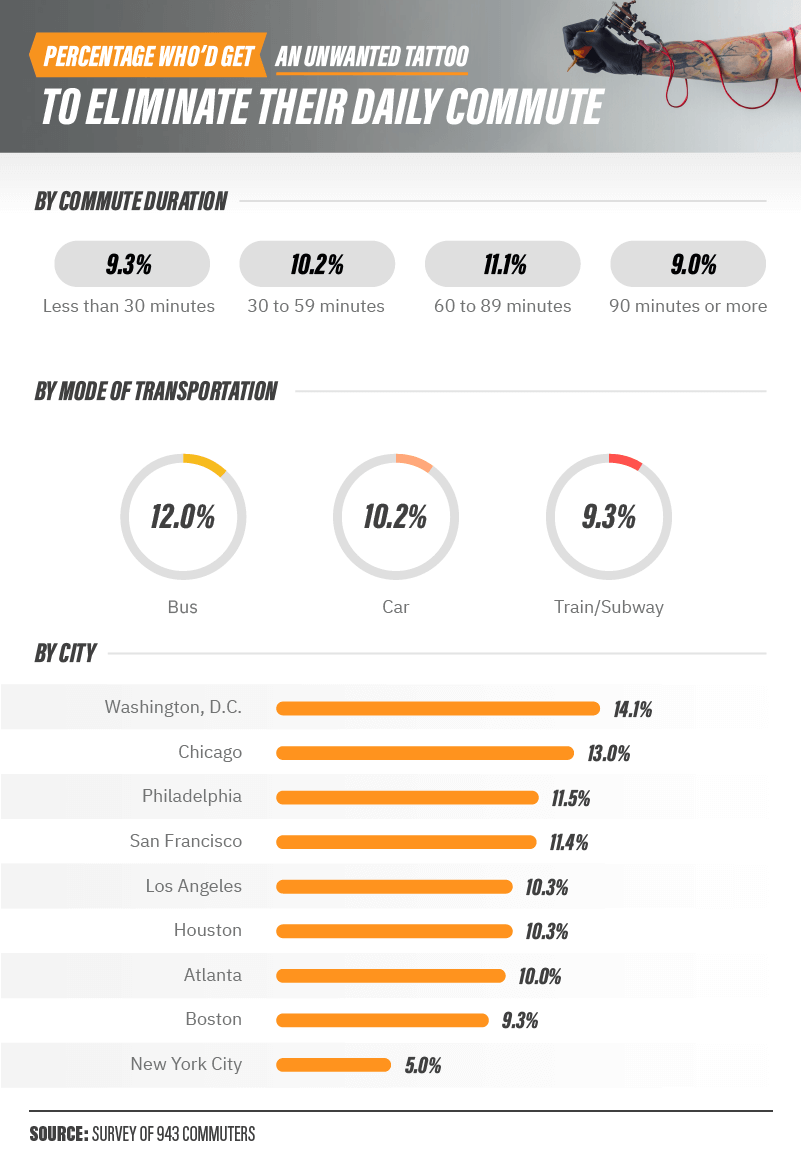
Giving up porn or social media for a year is a temporary sacrifice for shortening drive times. Of course, some people were willing to make a much more permanent offer if it meant being able to give up their daily commute.
11 percent of commuters traveling between 60 and 89 minutes to work every day were willing to get an unwanted tattoo in exchange for eliminating their commute. In addition to being more popular among people traveling by bus (12 percent), Washington D.C. traffic inspired 14 percent of commuters to get permanently inked for the chance to get out from behind the wheel.
Put Your Money Where Your Drive Is
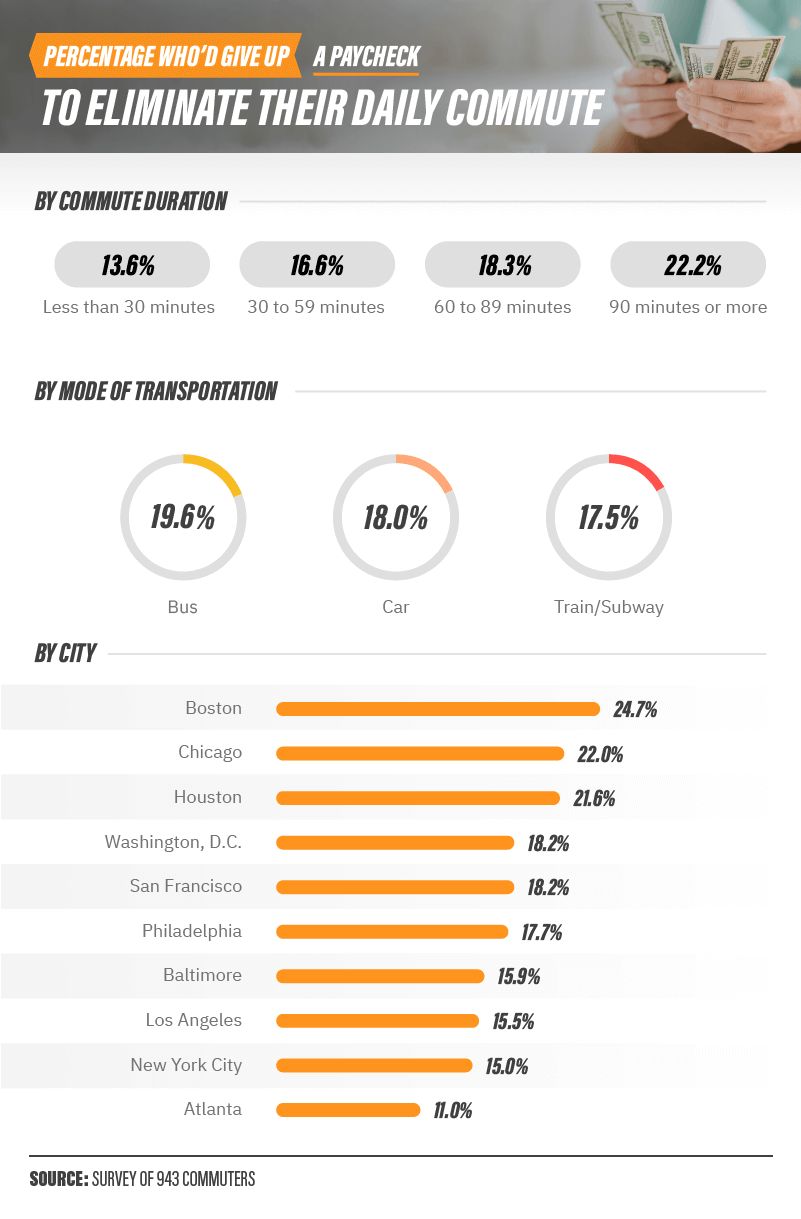
Commuting to work every day doesn’t just require a sacrifice of time or energy. In addition to the stress of being stuck in traffic and the loss of sleep and family time, the American commute costs hard cash. On average, people spend $2,600 every year getting to work and back home again, an expense that can be even greater for super-commuters.
Due to the cost of getting around, giving up a paycheck to eliminate your commute might not be such a bad idea. Our study found 22 percent of people traveling 90 minutes or more every day were willing to put a firm price tag on giving up their commute, as well as nearly 20 percent of people traveling by bus and nearly as many traveling by car. Residents most likely to write a check to get out of having to drive to work every day lived in Boston (25 percent), Chicago (22 percent), and Houston (22 percent).
Dreaming of Ditching Your Drive
When it comes to your daily commute, it can feel like being stuck between a rock and a hard place. Giving up your job for something closer to home may not feel like an option, and moving may not be any easier. Even with ways to pass the time getting to and from work, nearly half of people polled told us they hated the drive.
Even though many of these solutions weren’t realistic, respondents still offered to make sacrifices for the hypothetical opportunity to spend less time driving every day. As we found, commuters getting around via train or subway were often the most likely to go to great extremes to eliminate their commute. While Philadelphia and Chicago residents weren’t shy about how far they’d be willing to go to get rid of their daily commute, it was traffic in San Francisco that ultimately ranked as the most loathsome. Apparently, near-perfect weather and those views of the Bay only go so far when you’re sitting in traffic, unable to enjoy them for hours out of each day.
Methodology
We collected 943 survey responses from Amazon’s Mechanical Turk. 46.3% of our participants were women, and 53.7% were men. Participants ranged in age from 18 to 73 with a mean of 33.6 and a standard deviation of 9.4. Any respondent who did not have a job and/or did not have a daily commute was disqualified. All respondents were from Atlanta, Baltimore, Boston, Chicago, Houston, Los Angeles, New York City, Philadelphia, San Francisco, or Washington, D.C. These cities have been identified from multiple sources as having some of the worst commute times in America.
Limitations
In order to accurately represent each city’s commuters, we set out to collected at least 100 respondents for each city. Most cities reached or surpassed this number, however, Philadelphia, Houston, San Francisco, and Baltimore had 99, 98, 92, and 47 respondents, respectively. It it possible that with more respondents for each city, we could have gained more insight into this population. Our survey also relies on self report. There are many issues with self reported data. These issues include, but are not limited to: selective memory, telescoping, attribution, and exaggeration.
Fair Use Statement
Are your readers feeling burnt out by all the time they have to spend behind the wheel? Feel free to share the results of our study for any noncommercial use as long as you include a link back to this page in your story.


